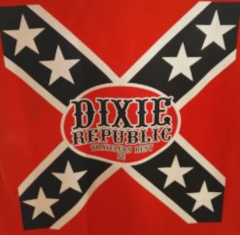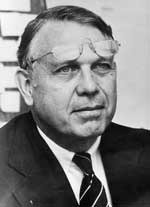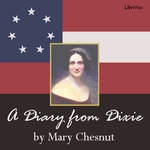A Diary From Dixie, Chapter 02
Page 6
II. MONTGOMERY, ALA.
February 19, 1861 - March 11, 1861
MONTGOMERY, Ala., February 19, 1861. - The brand-new Confederacy is making or remodeling its Constitution. Everybody wants Mr. Davis to be General-in-Chief or President. Keitt and Boyce and a party preferred Howell Cobb 1 for President. And the fire-eaters per se wanted Barnwell Rhett.
My brother Stephen brought the officers of the "Montgomery Blues" to dinner. "Very soiled Blues," they said, apologizing for their rough condition. Poor fellows! they had been a month before Fort Pickens and not allowed to attack it. They said Colonel Chase built it, and so were sure it was impregnable. Colonel Lomax telegraphed to Governor Moore 2 if he might try to take it, "Chase or no Chase," and got for his answer, "No." "And now," say the Blues, "we have worked like niggers, and when the fun and fighting begin, they send us home and put regulars
1. A native of Georgia, Howell Cobb had long served in Congress, and in 1849 was elected Speaker. In 1851 he was elected Governor of Georgia, and in 1857 became Secretary of the Treasury in Buchanan's Administration. In 1861 he was a delegate from Georgia to the Provisional Congress which adopted the Constitution of the Confederacy, and presided over each of its four sessions.
2. Andrew Bary Moore, elected Governor of Alabama in 1859. In 1861, before Alabama seceded, he directed the seizure of United States forts and arsenals and was active afterward in the equipment of State troops.
Page 7
there." They have an immense amount of powder. The wheel of the car in which it was carried took fire. There was an escape for you! We are packing a hamper of eatables for them.
I am despondent once more. If I thought them in earnest because at first they put their best in front, what now? We have to meet tremendous odds by pluck, activity, zeal, dash, endurance of the toughest, military instinct. We have had to choose born leaders of men who could attract love and secure trust. Everywhere political intrigue is as rife as in Washington.
Cecil's saying of Sir Walter Raleigh that he could "toil terribly" was an electric touch. Above all, let the men who are to save South Carolina be young and vigorous. While I was reflecting on what kind of men we ought to choose, I fell on Clarendon, and it was easy to construct my man out of his portraits. What has been may be again, so the men need not be purely ideal types.
Mr. Toombs 1 told us a story of General Scott and himself. He said he was dining in Washington with Scott, who seasoned every dish and every glass of wine with the eternal refrain, "Save the Union; the Union must be preserved." Toombs remarked that he knew why the Union was so dear to the General, and illustrated his point by a steamboat anecdote, an explosion, of course. While the passengers were struggling in the water a woman ran up and down the bank crying, "Oh, save the red-headed
1. Robert Toombs, a native of Georgia, who early acquired fame as a lawyer, served in the Creek War under General Scott, became known in 1842 as a "State Rights Whig," being elected to Congress, where he was active in the Compromise measures of 1850. He served in the United States Senate from 1853 to 1861, where he was a pronounced advocate of the sovereignty of States, the extension of slavery, and secession. He was a member of the Confederate Congress at its first session and, by a single vote, failed of election as President of the Confederacy. After the war, he was conspicuous for his hostility to the Union.
Page 8
man!" The red-headed man was saved, and his preserver, after landing him noticed with surprise how little interest in him the woman who had made such moving appeals seemed to feel. He asked her "Why did you make that pathetic outcry?" She answered, "Oh, he owes me ten thousand dollars." "Now General," said Toombs, "the Union owes you seventeen thousand dollars a year!" I can imagine the scorn on old Scott's face.
February 25th - Find every one working very hard here. As I dozed on the sofa last night, could hear the scratch, scratch of my husband's pen as he wrote at the table until midnight.
After church to-day, Captain Ingraham called. He left me so uncomfortable. He dared to express regrets that he had to leave the United States Navy. Ha had been stationed in the Mediterranean, where he liked to be , and expected to be these two years, and to take those lovely daughters of his to Florence. Then came Abraham Lincoln, and rampant black Republicanism, and he must lay down his life for South Carolina. He, however, does not make any moan. He says we lack everything necessary in naval gear to retake Fort Sumter. Of course, he only expects the navy to take it. He is a fish out of water here. He is one of the finest sea-captains; so I suppose they will soon give him a ship and send him back to his own element.
At dinner Judge - was loudly abusive of Congress. He said: "They have trampled the Constitution underfoot. They have provided President Davis with a house." He was disgusted with the folly of parading the President at the inauguration in a coach drawn by four white horses. Then some one said Mrs. Fitzpatrick was the only lady who sat with the Congress. After the inaugural she poked Jeff Davis in the back with her parasol that he might turn and speak to her. "I am sure that was democratic enough," said some one.
Governor Moore came in with the latest news - a telegram
Page 9
from Governor Pickens to the President, " that a war steamer is lying off the Charleston bar laden with reenforcements for Fort Sumter, and what must we do?" Answer: "Use your own discretion!" There is faith for you, after all is said and done. It is believed there is still some discretion left in South Carolina fit for use.
Everybody who comes here wants an office, and the many who, of course, are disappointed raise a cry of corruption against the few who are successful. I thought we had left all that in Washington. Nobody is willing to be out of sight, and all will take office.
"Constitution" Browne says he is going to Washington for twenty-four hours. I mean to send by him to Mary Garnett for a bonnet ribbon. If they take him up as a traitor, he may cause a civil war. War is now our dread. Mr. Chesnut told him not to make himself a bone of contention.
Everybody means to go into the army. If Sumter is attacked, then Jeff Davis's troubles will begin. The Judge says a military despotism would be best for us - anything to prevent a triumph of the Yankees. All right, but every man objects to any despot but himself.
Mr. Chesnut, in high spirits, dines to-day with the Louisiana delegation. Breakfasted with "Constitution" Browne, who is appointed Assistant Secretary of State, and so does not go to Washington. There was at table the man who advertised for a wife, with the wife so obtained. She was not pretty. We dine at Mr. Pollard's and go to a ball afterward at Judge Bibb's. The New York Herald says Lincoln stood before Washington's picture at his inauguration, which was taken by the country as a good sign. We are always frantic for a good sign. Let us pray that a Cæsar or a Napoleon may be sent us. That would be our best sign of success. But they still say, "No war." Peace let it be, kind Heaven!
Dr. De Leon called, fresh from Washington, and says
Page 10
General Scott is using all his power and influence to prevent officers from the South resigning their commissions, among other things promising that they shall never be sent against us in case of war. Captain Ingraham, in his short, curt way, said: "That will never do. If they take their government's pay they must do its fighting."
A brilliant dinner at the Pollards's. Mr. Barnwell 1 took me down. Came home and found the Judge and Governor Moore waiting to go with me to the Bibbs's. And they say it is dull in Montgomery! Clayton, fresh from Washington, was at the party and told us "there was to be peace."
February 28th. - In the drawing-room a literary lady began a violent attack upon this mischief-making South Carolina. She told me she was a successful writer in the magazines of the day, but when I found she used "incredible" for "incredulous," I said not a word in defense of my native land. I left her "incredible." Another person came in, while she was pouring upon me her home troubles, and asked if she did not know I was a Carolinian. Then she gracefully reversed her engine, and took the other tack, sounding our praise, but I left her incredible and I remained incredulous, too.
Brewster says the war specks are growing in size. Nobody at the North, or in Virginia, believes we are in earnest. They think we are sulking and that Jeff Davis and Stephens 2 are getting up a very pretty little comedy. The
1. Robert Woodward Barnwell, of South Carolina, a graduate of Harvard, twice a member of Congress and afterward United States Senator. In 1860, after the passage of the Ordinance of Secession, he was one of the Commissioners who went to Washington to treat with the National Government for its property within the State. He was a member of the Convention at Montgomery and gave the casting vote which made Jefferson Davis President of the Confederacy.
2. Alexander H. Stephens, the eminent statesman of Georgia, who before the war had been conspicuous in all the political movements of his time and in 1861 became Vice-President of the Confederacy. After the war he again became conspicuous in Congress and wrote a history entitled "The War between the States."
Page 11
Virginia delegates were insulted at the peace conference; Brewster said, "kicked out."
The Judge thought Jefferson Davis rude to him when the latter was Secretary of War. Mr. Chesnut persuaded the Judge to forego his private wrong for the public good, and so he voted for him, but now his old grudge has come back with an increased venomousness. What a pity to bring the spites of the old Union into this new one! It seems to me already men are willing to risk an injury to our cause, if they may in so doing hurt Jeff Davis.
March 1st.-Dined to-day with Mr. Hill 1 from Georgia, and his wife. After he left us she told me he was the celebrated individual who, for Christian scruples, refused to fight a duel with Stephens.2 She seemed very proud of him for his conduct in the affair. Ignoramus that I am, I had not heard of it. I am having all kinds of experiences. Drove to-day with a lady who fervently wished her husband would go down to Pensacola and be shot. I was dumb with amazement, of course. Telling my story to one who knew the parties, was informed, "Don't you know he beats her?" So I have seen a man "who lifts his hand against a woman in aught save kindness."
1. Benjamin H. Hill, who had already been active in State and National affairs when the Secession movement was carried through. He had been an earnest advocate of the Union until in Georgia the resolution was passed declaring that the State ought to secede. He then became a prominent supporter of secession. He was a member of the Confederate Congress, which met in Montgomery in 1861, and served in the Confederate Senate until the end of the war. After the war, he was elected to Congress and opposed the Reconstruction policy of that body. In 1877 he was elected United States Senator from Georgia.
2. Governor Herschel V. Johnson also declined, and doubtless for similar reasons, to accept a challenge from Alexander H. Stephens, who, though endowed with the courage of a gladiator, was very small and frail.
Page 12
Brewster says Lincoln passed through Baltimore disguised, and at night, and that he did well, for just now Baltimore is dangerous ground. He says that he hears from all quarters that the vulgarity of Lincoln, his wife, and his son is beyond credence, a thing you must see before you can believe it. Senator Stephen A. Douglas told Mr. Chesnut that "Lincoln is awfully clever, and that he had found him a heavy handful."
Went to pay my respects to Mrs. Jefferson Davis. She met me with open arms. We did not allude to anything by which we are surrounded. We eschewed politics and our changed relations.
March 3d. - Everybody in fine spirits in my world. They have one and all spoken in the Congress 1 to their own perfect satisfaction. To my amazement the Judge took me aside, and, after delivering a panegyric upon himself (but here, later, comes in the amazement), he praised my husband to the skies, and said he was the fittest man of all for a foreign mission. Aye; and the farther away they send us from this Congress the better I will like it.
Saw Jere Clemens and Nick Davis, social curiosities. They are Anti-Secession leaders; then George Sanders and George Deas. The Georges are of opinion that it is folly to try to take back Fort Sumter from Anderson and the United States; that is, before we are ready. They saw in Charleston the devoted band prepared for the sacrifice; I mean, ready to run their heads against a stone wall. Dare devils they are. They have dash and courage enough, but science only could take that fort. They shook their heads.
March 4th. - The Washington Congress has passed peace
1. It was at this Congress that Jefferson Davis, on February 9, 1861, was elected President, and Alexander H. Stephens Vice-President of the Confederacy. The Congress continued to meet in Montgomery until its removal to Richmond, in July, 1861.
Page 13
measures. Glory be to God (as my Irish Margaret used to preface every remark, both great and small).
At last, according to his wish, I was able to introduce Mr. Hill, of Georgia, to Mr. Mallory,1 and also Governor Moore and Brewster, the latter the only man without a title of some sort that I know in this democratic subdivided republic.
I have seen a negro woman sold on the block at auction. She overtopped the crowd. I was walking and felt faint, seasick. The creature looked so like my good little Nancy, a bright mulatto with a pleasant face. She was magnificently gotten up in silks and satins. She seemed delighted with it all, sometimes ogling the bidders, sometimes looking quiet, coy, and modest, but her mouth never relaxed from its expanded grin of excitement. I dare say the poor thing knew who would buy her. I sat down on a stool in a shop and disciplined my wild thoughts. I tried it Sterne fashion. You know how women sell themselves and are sold in marriage from queens downward, eh? You know what the Bible says about slavery and marriage; poor women! poor slaves! Sterne, with his starling - what did he know? He only thought, he did not feel.
In Evan Harrington I read: "Like a true English female, she believed in her own inflexible virtue, but never trusted her husband out of sight."
The New York Herald says: "Lincoln's carriage is not bomb-proof; so he does not drive out." Two flags and a bundle of sticks have been sent him as gentle reminders. The sticks are to break our heads with. The English are gushingly unhappy as to our family quarrel. Magnanimous of them, for it is their opportunity.
1. Stephen R. Mallory was the son of a shipmaster of Connecticut, who had settled in Key West in 1820. From 1851 to 1861 Mr. Mallory was United States Senator from Florida, and after the formation of the Confederacy, became its Secretary of the Navy.
Page 14
March 5th. - We stood on the balcony to see our Confederate flag go up. Roars of cannon, etc., etc. Miss Sanders complained (so said Captain Ingraham) of the deadness of the mob. "It was utterly spiritless," she said; "no cheering, or so little, and no enthusiasm." Captain Ingraham suggested that gentlemen "are apt to be quiet," and this was "a thoughtful crowd, the true mob element with us just -now is hoeing corn." And yet! It is uncomfortable that the idea has gone abroad that we have no joy, no pride, in this thing. The band was playing "Massa in the cold, cold ground." Miss Tyler, daughter of the former President of the United States, ran up the flag.
Captain Ingraham pulled out of his pocket some verses sent to him by a Boston girl. They were well rhymed and amounted to this: she held a rope ready to hang him, though she shed tears when she remembered his heroic rescue of Koszta. Koszta, the rebel! She calls us rebels, too. So it depends upon whom one rebels against - whether to save or not shall be heroic.
I must read Lincoln's inaugural. Oh, "comes he in peace, or comes he in war, or to tread but one measure as Young Lochinvar?" Lincoln's aim is to seduce the border States.
The people, the natives, I mean, are astounded that I calmly affirm, in all truth and candor, that if there were awful things in society in Washington, I did not see or hear of them. One must have been hard to please who did not like the people I knew in Washington.
Mr. Chesnut has gone with a list of names to the President - de Treville, Kershaw, Baker, and Robert Rutledge. They are taking a walk, I see. I hope there will be good places in the army for our list.
March 8th. - Judge Campbell, 1 of the United States
1. John Archibald Campbell, who had settled in Montgomery and was appointed Associate Justice of the United States Supreme Court by President Pierce in 1853. Before he resigned, he exerted all his influence to prevent Civil War and opposed secession, although he believed that States had a right to secede.
Page 15
Supreme Court, has resigned. Lord! how he must have hated to do it. How other men who are resigning high positions must hate to do it.
Now we may be sure the bridge is broken. And yet in the Alabama Convention they say Reconstructionists abound and are busy.
Met a distinguished gentleman that I knew when he was in more affluent circumstances. I was willing enough to speak to him, but when he saw me advancing for that purpose, to avoid me, he suddenly dodged around a corner - William, Mrs. de Saussure's former coachman. I remember him on his box, driving a handsome pair of bays, dressed sumptuously in blue broadcloth and brass buttons; a stout, respectable, fine-looking, middle-aged mulatto. He was very high and mighty.
Night after night we used to meet him as fiddler-in-chief of all our parties. He sat in solemn dignity, making faces over his bow, and patting his foot with an emphasis that shook the floor. We gave him five dollars a night; that was his price. His mistress never refused to let him play for any party. He had stable-boys in abundance. He was far above any physical fear for his sleek and well-fed person. How majestically he scraped his foot as a sign that he was tuned up and ready to begin!
Now he is a shabby creature indeed. He must have felt his fallen fortunes when he met me - one who knew him in his prosperity. He ran away, this stately yellow gentleman, from wife and children, home and comfort. My Molly asked him "Why? Miss Liza was good to you, I know." I wonder who owns him now; he looked forlorn.
Governor Moore brought in, to be presented to me, the President of the Alabama Convention. It seems I had
Page 16
known him before he had danced with me at a dancing-school ball when I was in short frocks, with sash, flounces, and a wreath of roses. He was one of those clever boys of our neighborhood, in whom my father 1 saw promise of better things, and so helped him in every way to rise, with books, counsel, sympathy. I was enjoying his conversation immensely, for he was praising my father I without stint, when the Judge came in, breathing fire and fury. Congress has incurred his displeasure. We are abusing one another as fiercely as ever we have abased Yankees. It is disheartening.
March 10th. - Mrs. Childs was here to-night (Mary Anderson, from Statesburg), with several children. She is lovely. Her hair is piled up on the top of her head oddly. Fashions from France still creep into Texas across Mexican borders. Mrs. Childs is fresh from Texas. Her husband is an artillery officer, or was. They will be glad to promote him here. Mrs. Childs had the sweetest Southern voice, absolute music. But then, she has all of the high spirit of those sweet-voiced Carolina women, too.
Then Mr. Browne came in with his fine English accent, so pleasant to the ear. He tells us that Washington society is not reconciled to the Yankee régime. Mrs. Lincoln means to economize. She at once informed the majordomo that they were poor and hoped to save twelve thousand dollars every year from their salary of twenty thousand. Mr. Browne said Mr. Buchanan's farewell was far more imposing than Lincoln's inauguration.
The people were so amusing, so full of Western stories.
1. Mrs. Chesnut's father was Stephen Decatur Miller, who was born in South Carolina in 1787, and died in Mississippi in 1838. He was elected to Congress in 1816, as an Anti-Calhoun Democrat, and from 1828 to 1830 was Governor of South Carolina. He favored Nullification, and in 1830 was elected United States Senator from South Carolina, but resigned three years afterward in consequence of ill health. In 1835 he removed to Mississippi and engaged in cotton growing.
Page 17
Dr. Boykin behaved strangely. All day he had been gaily driving about with us, and never was man in finer spirits. To-night, in this brilliant company, he sat dead still as if in a trance. Once, he waked somewhat - when a high public functionary came in with a present for me, a miniature gondola, "A perfect Venetian specimen," he assured me again and again. In an undertone Dr. Boykin muttered: "That fellow has been drinking." "Why do you think so?" "Because he has told you exactly the same thing four times." Wonderful! Some of these great statesmen always tell me the same thing - and have been telling me the same thing ever since we came here.
A man came in and some one said in an undertone, "The age of chivalry is not past, O ye Americans!" "What do you mean?" "That man was once nominated by President Buchanan for a foreign mission, but some Senator stood up and read a paper printed by this man abusive of a woman, and signed by his name in full. After that the Senate would have none of him; his chance was gone forever."
March 11th. - In full conclave to-night, the drawing-room crowded with Judges, Governors, Senators, Generals, Congressmen. They were exalting John C. Calhoun's hospitality. He allowed everybody to stay all night who chose to stop at his house. An ill-mannered person, on one occasion, refused to attend family prayers. Mr. Calhoun said to the servant, "Saddle that man's horse and let him go." From the traveler Calhoun would take no excuse for the "Deity offended." I believe in Mr. Calhoun's hospitality, but not in his family prayers. Mr. Calhoun's piety was of the most philosophical type, from all accounts. 1
The latest news is counted good news; that is, the last man who left Washington tells us that Seward is in the ascendancy. He is thought to be the friend of peace.
1. John C. Calhoun had died in March, 1850.
Page 18
The man did say, however that "that serpent Seward is in the ascendancy just now."
Harriet Lane has eleven suitors. One is described as likely to win, or he would be likely to win, except that he is too heavily weighted. He has been married before and goes about with children and two mothers. There are limits beyond which! Two mothers-in-law!
Mr. Ledyard spoke to Mrs. Lincoln in behalf of a doorkeeper who almost felt he had a vested right, having been there since Jackson's time; but met with the same answer; she had brought her own girl and must economize. Mr. Ledyard thought the twenty thousand (and little enough it is) was given to the President of these United States to enable him to live in proper style, and to maintain an establishment of such dignity as befits the head of a great nation. It is an infamy to economize with the public money and to put it into one's private purse. Mrs. Browne was walking with me when we were airing our indignation against Mrs. Lincoln and her shabby economy. The Herald says three only of the élite Washington families attended the Inauguration Ball.
The Judge has just come in and said: "Last night, after Dr. Boykin left on the cars, there came a telegram that his little daughter, Amanda, had died suddenly." In some way he must have known it beforehand. He changed so suddenly yesterday, and seemed so careworn and unhappy. He believes in clairvoyance, magnetism, and all that. Certainly, there was some terrible foreboding of this kind on his part.
Tuesday. - Now this, they say, is positive: "Fort Sumter is to be released and we are to have no war." After all, far too good to be true. Mr. Browne told us that, at one of the peace intervals (I mean intervals in the interest of peace), Lincoln flew through Baltimore, locked up in an express car. He wore a Scotch cap.
We went to the Congress. Governor Cobb, who presides
Page 19
over that august body, put James Chesnut in the chair, and came down to talk to us. He told us why the pay of Congressmen was fixed in secret session, and why the amount of it was never divulged - to prevent the lodginghouse and hotel people from making their bills of a size to cover it all. "The bill would be sure to correspond with the pay," he said.
In the hotel parlor we had a scene. Mrs. Scott was describing Lincoln, who is of the cleverest Yankee type. She said: "Awfully ugly, even grotesque in appearance, the kind who are always at the corner stores, sitting on boxes, whittling sticks, and telling stories as funny as they are vulgar." Here I interposed: "But Stephen A. Douglas said one day to Mr. Chesnut, 'Lincoln is the hardest fellow to handle I have ever encountered yet.' " Mr. Scott is from California, and said Lincoln is "an utter American specimen, coarse, rouge, and strong; a good-natured, kind creature; as pleasant-tempered as he is clever, and if this country can be joked and laughed out of its rights he is the kind-hearted fellow to do it. Now if there is a war and it pinches the Yankee pocket instead of filling it - "
Here a shrill voice came from the next room (which opened upon the one we were in by folding doors thrown wide open) and said: "Yankees are no more mean and stingy than you are. People at the North are just as good as people at the South." The speaker advanced upon us in great wrath.
Mrs. Scott apologized and made some smooth, polite remark, though evidently much embarrassed. But the vinegar face and curly pate refused to receive any concessions, and replied: "That comes with a very bad grace after what you were saying," and she harangued us loudly for several minutes. Some one in the other room giggled outright, but we were quiet as mice. Nobody wanted to hurt her feelings. She was one against so many. If I were at the
Page 20
North, I should expect them to belabor us, and should hold my tongue. We separated North from South because of incompatibility of temper. We are divorced because we have hated each other so. If we could only separate, a "separation à l'agréable," as the French say it, and not have a horrid fight for divorce.
The poor exile had already been insulted, she said. She was playing "Yankee Doodle" on the piano before breakfast to soothe her wounded spirit, and the Judge came in and calmly requested her to "leave out the Yankee while she played the Doodle." The Yankee end of it did not suit our climate, he said; was totally out of place and had got out of its latitude.
A man said aloud: "This war talk is nothing. It will soon blow over. Only a fuss gotten up by that Charleston clique." Mr. Toombs asked him to show his passports, for a man who uses such language is a suspicious character.











